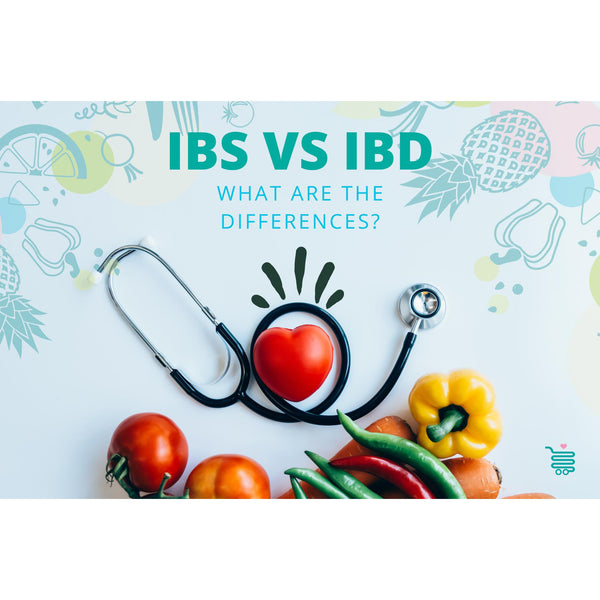- Ph: +61 435 003 412
- operations@fodshopper.com.au
"Organic Orange" has been added to your cart. View cart
"Organic Orange" has been added to your cart. View cart

Both Irritable Bowel Syndrome (IBS) and Inflammatory Bowel Disorder (IBD) are gastrointestinal disorders and have very similar symptoms, ranging from abdominal pain to changes in bowel movements.
So what is the difference between the two? In IBD, the gastrointestinal tract is inflamed and damaged however, in IBS, the tract has no permanent damage, no inflammation and no increased risk of colorectal cancer. Both require very different treatments to manage symptoms and therefore, it is important to receive an accurate diagnosis from an Accredited Practising Dietitian (Australia) or Registered Dietitian (NZ, Canada & USA).
Let's delve deeper into the similarities and differences of the two conditions.
IBD is a chronic inflammatory disease, including Crohn's Disease (CD) and Ulcerative Colitis (UC). The immune cells in our body normally protect us from infection and harmful substances. However, with IBD, the immune cells mistake harmless substances in the body as dangerous, attacking the intestine's lining and causing inflammation and ulceration.
These inflammatory processes can cause frequent/urgent bowel movements, abdominal pain, diarrhoea and bleeding. Other symptoms of IBD can include fatigue, loss of appetite, and weight loss. The symptoms vary per person and without treatment, flare ups are common causes for discomfort.
With treatment however, the body goes into remission and flare ups can be less frequent. Complications without treatment for IBD include:
IBS is a functional gastrointestinal disorder that can significantly affect quality of life. Normally, the muscles in the intestine contract and relax to process food. However, in IBS, this process is disturbed and can cause uncomfortable symptoms.
These symptoms range from mild to severe, including cramping, bloating, constipation, flatulence, abdominal pain, and diarrhoea. Just like in IBD, there can be phases of little to no symptoms and stress can aggravate symptoms.
The causes of IBS and IBD are currently unknown.
For IBD, risk factors include:
IBD can occur at any age. The average age for CD diagnosis is 29.5 years, and for UC it is 34.9 years, affecting both genders equally.
There are also no known causes for IBS, however, changes in the microbiome, heightened gut sensitivity and chemical imbalances may be responsible.
IBS can occur at all ages however, most people are diagnosed under 50 and it is most common in women. IBS is most likely inherited from a parent, but roughly 40% of cases develop after a digestive system infection (post-infectious IBS).
Another cause may be psychological distress, which can result from anxiety, depression or childhood traumas.
IBD is diagnosed through blood tests, stool tests, endoscopic procedures (upper endoscopy for CD or sigmoidoscopy for UC, colonoscopy for both), or external imaging procedures.
In order to assist in diagnosing IBS, blood and stool samples may also be taken along with endoscopic and imaging procedures. No inflammation should be present in any results.
IBS is diagnosed via the Rome IV Criteria, which is “recurrent abdominal pain on average one day a week in the last three months, associated with at least 2 of the following”
Please visit your doctor if you suspect you have IBS. It is also important that, once a diagnosis is made, you make contact with an Accredited Practising Dietitian (Australia) or Registered Dietitian (NZ, Canada & USA) to discuss how dietary and/or lifestyle factors may influence your symptoms.
There is no current cure for either IBD or IBS, however medical treatment can control symptoms and reduce inflammation in the case of IBD.
There is 'no one size fits all' approach to treatment, and it is essential that you get in contact with the right practitioner to help you address your symptoms.
Here are some general tips for managing IBS and IBD:
- Eat smaller meals
- Reduce consumption of greasy/fried foods
- Watch dairy intake (especially if lactose intolerant)
- Keep a food diary and eliminate trigger foods
In some cases, visiting a psychologist for help with anxiety or depression, or psychological therapy (such as cognitive behavioural therapy or gut-directed hypnotherapy) can help. Reducing and managing stress by seeking out help, regularly exercising, eating a balanced and healthy diet, and getting plenty of sleep, will all help manage symptoms.

IBS and IBD have similarities between their symptoms however, they are completely different conditions that should be managed accordingly. It is essential that you get advice from a general practitioner or Accredited Practising Dietitian (Australia) or Registered Dietitian (NZ, Canada & USA) to ensure your symptoms are well managed.
1. Inflammatory Bowel Disease vs. Irritable Bowel Syndrome [Internet]. Crohnscolitisfoundation.org. 2019 [cited 20 July 2022]. Available from: https://www.crohnscolitisfoundation.org/sites/default/files/2019-10/ibd-and-IBS-brochure-final.pdf
2. Rome IV Criteria - Rome Foundation [Internet]. Rome Foundation. 2022 [cited 17 March 2022]. Available from: https://theromefoundation.org/rome-iv/rome-iv-criteria/

Leave a reply